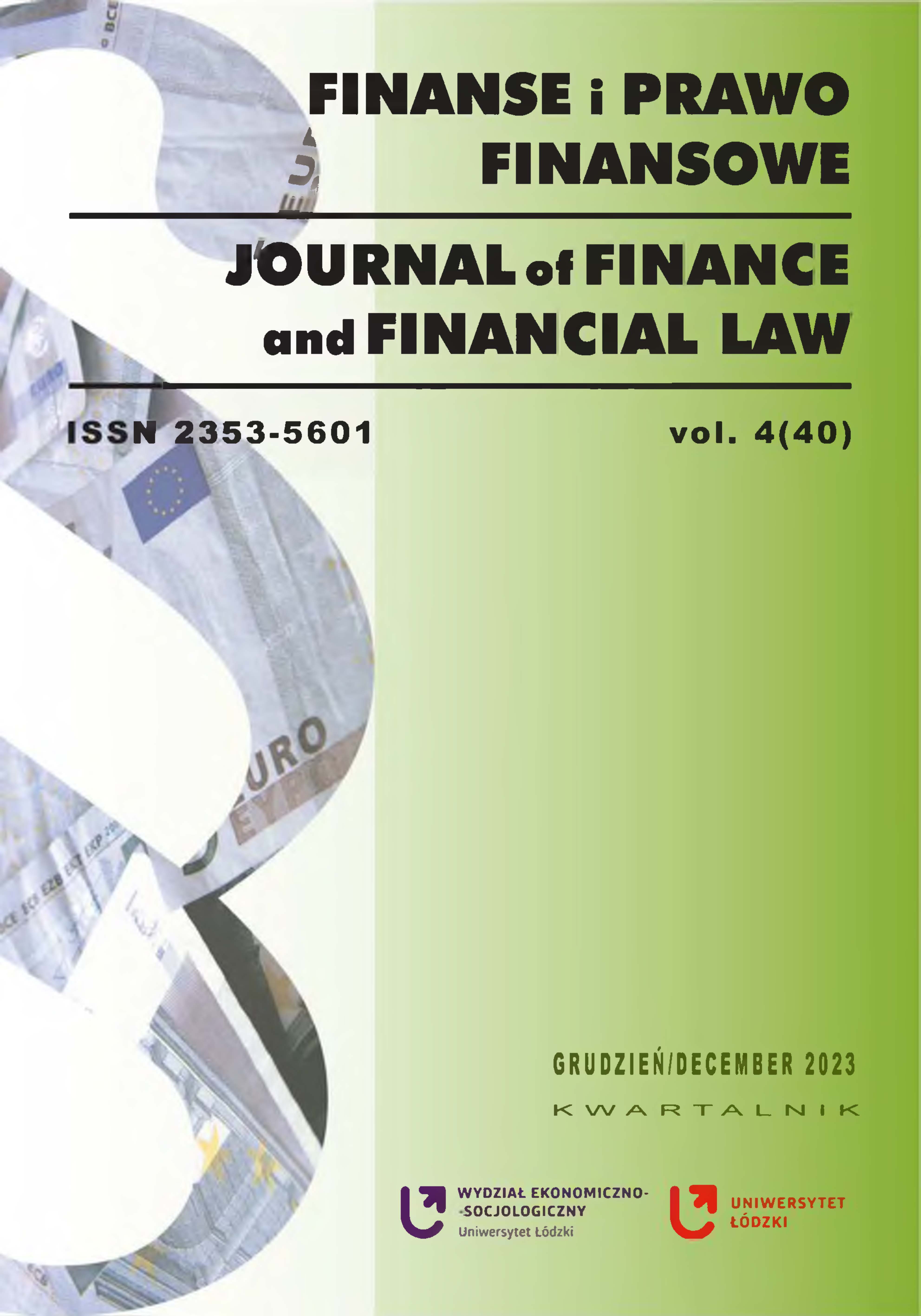Household Saving in Crisis – Literature Review
DOI:
https://doi.org/10.18778/2391-6478.4.40.04Keywords:
saving, household finance, pandemic, crisis, precautionary savingAbstract
The purpose of this article is to compare the focus of researchers and the saving behavior of households in different types of crises within the scope of the financial crisis of 2008 and the pandemic crisis.
The research focused on the literature review of publications in the WoS bibliographic database concentrated on saving and personal finance with the addition of a crisis or pandemic. 276 publications in the WoS category of Economics were identified. Full and fractional clustering with VOS Viewer was applied.
It has been found that there are differences in the behavior of households and in the focus of researchers concerning analyzed terms between the pandemic and other crises. In the case of the financial crisis of 2008, a broader approach prevailed, considering the situation of the financial market and its liquidity, but also inequalities and imbalances at the individual, national and international levels. When it comes to the pandemic, the term savings had the most associations with problems related to the situation of an individual household. Attention was paid to financial security, income, wealth, and demand generated by the household.
Downloads
References
Achou B., Boisclair D, d’Astous P., Fonseca R., Glenzer F., Michaud P-C. (2020), Early Impact of the COVID-19 Pandemic on Household Finances in Quebec, Canadian Public Policy, Vol. 46, https://doi.org/10.3138/cpp.2020-087
Google Scholar
DOI: https://doi.org/10.3138/cpp.2020-087
Bhutta N., Blair J., Dettling L.,and Moore K. (2020), COVID-19,THE CARES ACT, AND FAMILIES' FINANCIAL SECURITY, National Tax Journal, Vol.73, https://doi.org/10.17310/ntj.2020.3.02
Google Scholar
DOI: https://doi.org/10.2139/ssrn.3631903
Bohdalova M., Pazicky M. (2019), Dynamics of Household Savings and Consumption in the Euro Area, Ekonomicky Casopis, 67(7), pp. 679-697.
Google Scholar
Borowski J., Jaworski K. (2023), Economic and behavioral determinants of forced household savings during the COVID-19 pandemic, Empirica, https://doi.org/10.1007/S10663-022-09563-8
Google Scholar
DOI: https://doi.org/10.1007/s10663-022-09563-8
Bouyon S. (2016), Policy Options for European Household Saving, Journal of Economic Integration, 31(1), https://doi.org/10.11130/jei.2016.31.1.134
Google Scholar
DOI: https://doi.org/10.11130/jei.2016.31.1.134
Brown S.,Taylor K. (2014), Household finances and the "Big Five" personality traits, Journal of Economic Psychology, pp. 197–212, https://doi.org/10.1016/j.joep.2014
Google Scholar
DOI: https://doi.org/10.1016/j.joep.2014.10.006
Browning M., Lusardi A. (1996) Household Saving : Micro Theories and Micro Facts, Journal of Economic Literature, XXXIV(December), pp. 1797–1855.
Google Scholar
Van Der Cruijsen A. B., de Haan J., Jansen D-J., Mosch R. H. J. (2012), Households Decisions on Savings Accounts After Negative Experiences with Banks During the Financial Crisis, Journal of Consumer Affairs, 46(3), https://doi.org/10.1111/j.1745-6606.2012.01240.x
Google Scholar
DOI: https://doi.org/10.1111/j.1745-6606.2012.01240.x
Dey-Chowdhury S., Blinston A., Chamberlin G. (2022), Economic modelling of forced saving during the coronavirus (COVID-19) pandemic, Office for National Statistics (UK), pp. 1–11.
Google Scholar
Fitzgerald J., Kenny S., Cermeno A. L. (2021), Household Behaviour in Ireland, Sweden, the US and the UK under Rationing, Economic Papers from Trinity College Dublin, Economics Department.
Google Scholar
Fitzgerald J., Kenny S., Cermeno A. L. (2023), Household Behaviour Under Rationing, National Institute Economic Review, https://doi.org/10.1017/nie.2022.19
Google Scholar
DOI: https://doi.org/10.1017/nie.2022.19
Gomes F. J., Haliassos M., Ramadorai T. (2020) Household finance, Frankfurt am Main, Germany, http://hdl.handle.net/10419/214836 [Accessed: 21.02.2023]
Google Scholar
Kolodko G. W. (2021), Shortageflation 3.0: War economy - State socialism – Pandemic crisis, Acta Oeconomica, https://doi.org/10.1556/032.2021.00027
Google Scholar
DOI: https://doi.org/10.32609/0042-8736-2021-10-5-26
Li J., Song Q., Peng C., Wu Y. (2020), COVID-19 Pandemic and Household Liquidity Constraints: Evidence from Micro Data, Emerging Markets Finance and Trade, 56(15), https://doi.org/10.1080/1540496X.2020.1854721
Google Scholar
DOI: https://doi.org/10.1080/1540496X.2020.1854721
Lugilde A., Bande R., Riveiro D. (2018), Precautionary saving in Spain during the great recession: evidence from a panel of uncertainty indicators, Review of Economics of the Household, 16(4), https://doi.org/10.1007/s11150-018-9412-6
Google Scholar
DOI: https://doi.org/10.1007/s11150-018-9412-6
Lusardi A. (1998), On the Importance of the Precautionary Saving Motive, American Economic Review, https://www.jstor.org/stable/116965 [Accessed: 20.02.2023].
Google Scholar
MacGee J., Pugh T. M., See K. (2022), The heterogeneous effects of COVID-19 on Canadian household consumption, debt and savings, Canadian Journal of Economics Revue canadienne d’economique, Vol. 55, https://doi.org/10.1111/caje.12546
Google Scholar
DOI: https://doi.org/10.1111/caje.12546
Ning L., Wang Y. Q. (2020), Quantitative Analysis of the COVID-19 Pandemic Shock to Household Consumption in China, Frontiers of Economics in China, 15(3), https://doi.org/10.3868/s060-011-020-0015-4
Google Scholar
Rughoo A., Sarantis N. (2014), The global financial crisis and integration in European retail banking, Journal of Banking & Finance, https://doi.org/10.1016/j.jbankfin.2013
Google Scholar
DOI: https://doi.org/10.1016/j.jbankfin.2013.11.017
Schneider M., Sellner R. (2022) Private consumption and savings during the COVID-19 pandemic in Austria, Monetary Policy & The Economy, https://www.oenb.at/dam [Accessed:18.02.2023]
Google Scholar
Snyder H. (2019), Literature review as a research methodology: An overview and guidelines, Journal of Business Research, https://doi.org/10.1016/j.jbusres.2019
Google Scholar
DOI: https://doi.org/10.1016/j.jbusres.2019.07.039
Waliszewski K., Warchlewska A. (2021), Comparative analysis of Poland and selected countries in terms of household financial behaviour during the COVID-19 pandemic, Equilibrium, Quarterly Journal of Economics and Economic Policy, 16(3), https://doi.org/10.24136/EQ.2021.021
Google Scholar
DOI: https://doi.org/10.24136/eq.2021.021
Wang-Ly N., Newell, B. (2022), Allowing early access to retirement savings: Lessons from Australia, Economic Analysis and Policy, Vol. 75, https://doi.org/10.1016/j.eap.2022
Google Scholar
DOI: https://doi.org/10.1016/j.eap.2022.07.002
Zhang, Y., Lu X., Yin H., Zhao, R.. (2021), Pandemic, risk-adaptation and household saving: evidence from China, China Finance Review International, https://doi.org/10.1108/CFRI-04-2021-0077 (ahead of print).
Google Scholar
DOI: https://doi.org/10.1108/CFRI-04-2021-0077
Zhuk M. (2015), Macroeconomic determinants of household savings in Ukraine, Economics and Sociology, https://doi.org/10.14254/2071-789X.2015/8-3/3
Google Scholar
DOI: https://doi.org/10.14254/2071-789X.2015/8-3/3
Zoega G. (2021), Financial Crises and Current Account Surpluses, Atlantic Economic Journal, https://doi.org/10.1007/s11293-021-09718-1
Google Scholar
DOI: https://doi.org/10.1007/s11293-021-09718-1
Downloads
Published
How to Cite
Issue
Section
License

This work is licensed under a Creative Commons Attribution-NonCommercial-NoDerivatives 4.0 International License.














